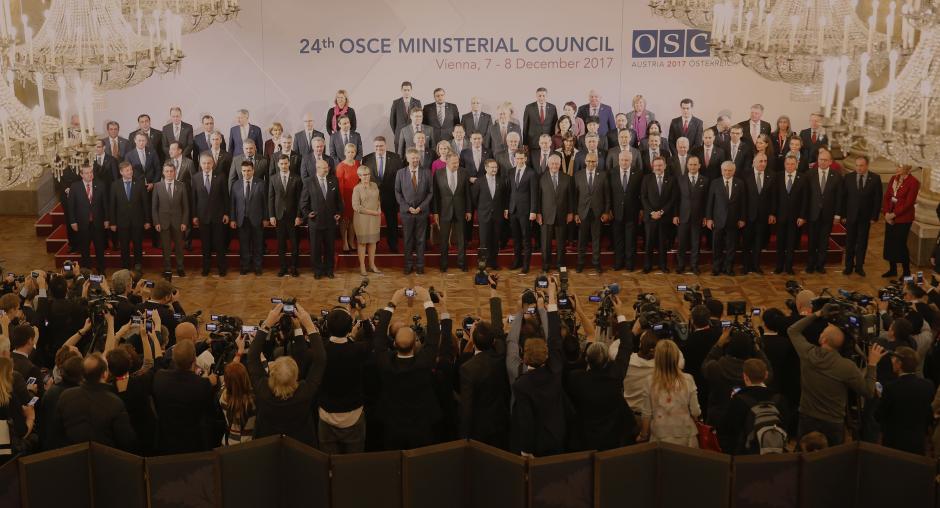OSCE is indispensable for security in Europe, today more than ever, says OSCE Chairperson-in-Office Kurz at opening of Vienna Ministerial Council

VIENNA, 7 December 2017 - The OSCE, now more than ever, is indispensable for security in Europe, said OSCE Chairperson-in-Office and Austria’s Foreign Minister Sebastian Kurz at the opening of the 24th Ministerial Council today in Vienna. He reminded the foreign ministers, state secretaries and high-level officials from the OSCE’s 57 participating States and 11 Partners for Co-operation that the security challenges facing the region can only be solved by consensus and overcoming the current crisis in confidence between states.
“In an organization with 57 members, not everyone can always be satisfied. But let me remind you that our co-operation is based on rules that we all adopted by consensus,” said Kurz. “It is therefore important that we all abide by these rules. We can only solve challenges by consensus. And to find that consensus requires trust, dialogue and a willingness to compromise.”
He said that the 24th Ministerial Council had been designed “so that we can make the best possible use of the OSCE as a platform for dialogue.”
“The crisis of confidence among our participating States continues, and we have to counter this trend,” said the OSCE Chairperson-in-Office. “More security will only be achieved with more confidence.”
Kurz noted that in spite of the challenges, the Austrian OSCE Chairmanship had made a number of achievements this year.
He said that 24/7 monitoring by patrols of the OSCE Special Monitoring Mission to Ukraine using the latest technology along the contact line, concrete progress in the 5+2 negotiations on Transdniestria, and in Georgia, dealing with environmental challenges and promoting dialogue channels across contact lines, had led to tangible benefits for communities affected by protracted conflicts.
Kurz noted progress in the Structured Dialogue among the participating States on addressing current and future security challenges.
In countering the threat of violent extremism and radicalization that leads to terrorism, he pointed to the report by his Special Representative Professor Peter Neumann which lists recommendations on how states can effectively combat the threat and make better use of the OSCE as a networking hub. Kurz added that in order to strengthen the role of the OSCE in this area of work in the long term, Austria would contribute an additional €250,000 to the organization.
Kurz also noted the Chairmanship’s success in filling the four vacant leadership functions of the OSCE, “which was very important to the functioning of the organization.”
Following the Chairperson-in-Office, the President of the OSCE Parliamentary Assembly George Tsereteli said: "In increasingly critical times, governments should make the best use of the OSCE. Only through co-operation and dialogue can we ensure mutual security. But while co-operation in some cases might require compromise, we cannot compromise on our values or on the founding principles of the OSCE.”
In his report to the Ministerial Council, OSCE Secretary General Thomas Greminger said: “Security begins with trust – and trust begins with dialogue. This is the impulse that drove the Helsinki process. It is high time we revive it today. We must recommit to the principles and commitments our organization stands for. At the same time, we must be pragmatic and find common ground where interests coincide, and build a unifying agenda for the OSCE. Small but steady steps will produce incremental progress. But this requires you, the participating States, to recommit wholeheartedly to genuine dialogue and co-operation.”
